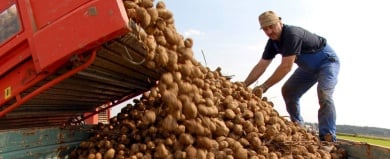The dramatic increase in food prices in recent months has led to hunger riots worldwide. To blame the increased interest in biofuels as the sole reason for this severe rise in food costs distracts from many other causes. At the moment, fuel crops cover only 2 percent of cultivated fields, while 30 percent are used to produce animal feed for intensive livestock farming. And this is a rising trend, as the growing middle classes in emerging economies such as China and India demand more livestock products.
Hunger has many causes
Further causes include increasing financial market speculation for grain, a neglect of small farms in developing countries, unequal landownership, and farm subsides which have favoured the agricultural industry at the expense of sustainable farming. Natural disasters and crop failures caused by climate change have compounded the problem.
In the midst of this worsening food crisis, the World Bank’s International Assessment of Agricultural Knowledge, Science and Technology for Development presented its global agricultural report on April 15. It showed the way toward a solution and it reaffirmed our Green policies.
The committee is calling for fundamental changes to global agriculture. Industrial agriculture with monocultures, intensive livestock farming and the use of pesticides and genetic engineering has undoubtedly increased yields considerably in recent decades, “but ordinary farmers, workers, rural communities and the environment are paying the price for it worldwide.” Therefore, especially in the case of developing countries, experts are urging that land use be adapted to local conditions, such as rural structures, traditional crops and production methods. Only sustainable agricultural practices should receive government subsidies, and agricultural research should be oriented toward serving farming in developing countries.
The Greens wholeheartedly support this sort of approach. The Common Agricultural Policy is due to be overhauled and we call on the European Union to push forward the movement toward sustainable agriculture. In the future, subsidies must be connected to improving the lot of society. We must support farming that is sound for both the environment and climate by strengthening rural development, by linking subsidies to job creation and creating incentives for especially climate-friendly forms of cultivation. In order to establish fair trade relations we want export subsidies, which distort trade, to be abolished by 2013 at the latest, independent from the progress of the WTO negotiations. We also call for subsidy payments on pork exports in developing countries to be discontinued immediately.
The German government needs to stop resisting reform when discussing EU agricultural subsidies and Berlin must take part in constructively recasting the CAP for a sustainable future. German Agriculture Minister Horst Seehofer can not concern himself only with subsidies for large farm companies while forgetting the world’s hungry.
Strengthening small farms
The Greens also call for development aid focus more on strengthening small-scale rural agriculture. Supporting self-sufficiency in rural areas is one of the most important starting points for getting the problem of hunger under control. The land rights of small farmers in developing nations must be protected and there must be further land reform as well. We need to strengthen the exchange of knowledge between local producers and support access to knowledge about new and expensive forms of cultivation.
In order to establish fair agricultural trade, we need to develop sustainability and human rights criteria not only for biofuels but for the entire farm sector globally. These criteria must also become a component of WTO agreements. This is a Herculean task, and it won’t be accomplished overnight. However, sustainability and human rights criteria for agricultural trade can already be anchored in bilateral treaties between the European Union and partner countries or groups of countries overseas.
Guidelines for biofuels production
The cultivation of plants for energy sources is increasing worldwide. We urgently need policies to be revised in order to counteract increasing competition for land with food production.
Policymakers must create strong guidelines which ensure that the use of biomass for energy neither aggravates the problem of hunger nor is detrimental to biodiversity.
We need to create a certification system that defines binding ecological and social standards for the cultivation and production of biofuels. However, this alone isn’t sufficient to ensure regulations aren’t flouted. The international community must carefully examine the policies of each and every country wanting to export biofuels or biofuel crops and evaluate them for their sustainability.
Ulrike Höfken is the chairwoman for the German parliament’s committee on Nutrition, Agriculture and Consumer Protection.



 Please whitelist us to continue reading.
Please whitelist us to continue reading.